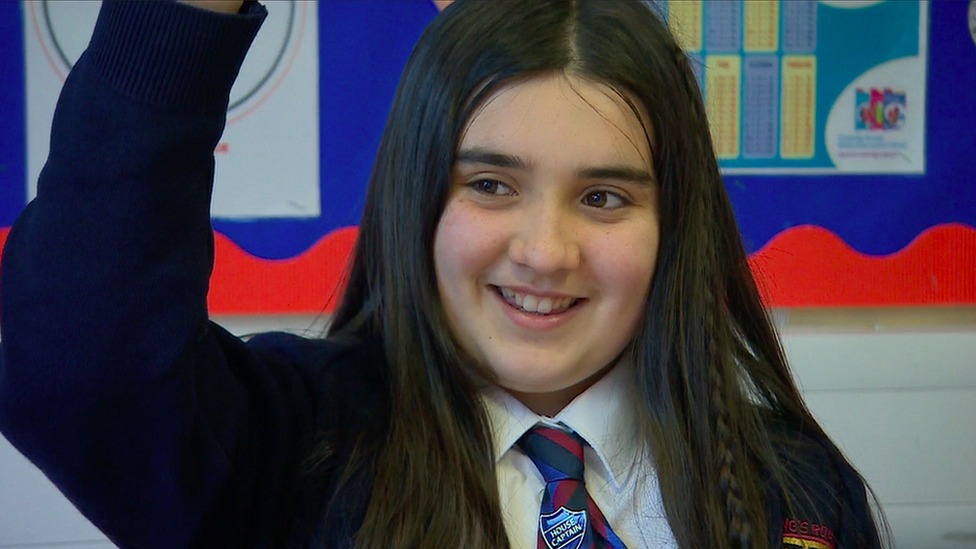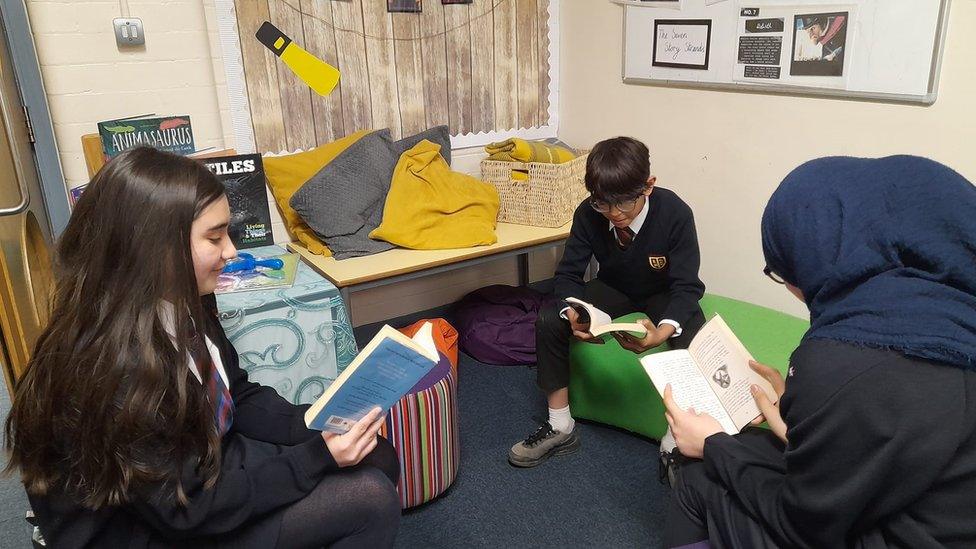School tutoring: One third of £594m post-lockdown cash unspent
- Published
- comments

Ria says NTP tutoring has changed her learning but thousands of schools have not used the scheme this year
About one third of the £594m earmarked for tutoring to help children catch up after Covid lockdowns has gone unspent, a BBC investigation has found.
The government's National Tutoring Programme (NTP) offers one-to-one or group lessons.
Schools must top up any government money from their own budgets, something some teachers say they cannot afford.
The government said it had helped millions of children - but Labour called the scheme a "shocking failure".
Almost £209m of the £594.3m allocated to the NTP for the previous two academic years has not been spent, according to a BBC Freedom of Information request.
The scheme, launched in November 2020, provides primary and secondary schools with funding to subsidise tutoring. Any money not spent each academic year is returned to the Treasury.
Charles Barnett, assistant head teacher at Wensleydale School and Sixth Form, welcomed the initial idea but said it took "a very short amount of time to realise it wouldn't work effectively for us".
"Both cost versus impact, they just didn't add up for us," he said. "And then we couldn't reach enough students with what they were offering in the ways that they were offering it, and there simply wasn't the choice for us as a small rural school to tap into that offer."
The latest Department for Education (DfE) data estimates that 66% of schools in England have participated in the NTP this academic year, as of January.
London has the highest rates of participation, at 73%. The lowest is seen in the North East, at 62%.
In the 21-22 academic year, 87% of schools in England used the scheme.
Ellen Widdup from Woodbridge has three children, aged 7, 13 and 15. She told BBC Radio Suffolk that as a single parent, she was working full time throughout the pandemic, making home schooling impossible. Ellen said her children definitely fell behind.
"I think that this offer from the government was brilliant in terms of helping children get back on track," she said. "I just think it's awful that all that money is now going back to the government when it could've been spent."
Dr Rebecca Montacute, head of research and policy at education charity Sutton Trust, said participation had been higher in cities where there were already "a lot more agencies operating or charities that were trying to get tutoring to disadvantaged students".
Your device may not support this visualisation
The NTP covered 75% of costs for school-led tutoring in the 21-22 academic year. This year, it provides 60%. In September, it is planned to drop to 25% for the 2023-24 academic year.
Dr Montacute said reducing the subsidy could mean schools either "won't want to or won't be able to" use the programme.
Steve Haines, Director of Public Affairs at youth charity Impetus, said evidence shows tutoring can help pupils make accelerated progress, but "the NTP will only work if schools are able to use it".
He added pupils from disadvantaged backgrounds were less likely "to pass their GCSE English and maths exams, and we are concerned that unless the government makes the changes necessary for more schools to use the scheme, they will fall behind even further".
The government had initially aimed for 65% of NTP tuition go to disadvantaged pupils. During the 21-22 academic year, 47% of the tuition did.
Bridget Phillipson MP, Labour's shadow education secretary, called the scheme a "shocking failure".
She said: "The government failed children throughout the pandemic and is failing to prioritise their futures now, with the result that the learning gap between children on free school meals and those not has widened to the biggest gap for a decade."
Lib Dem education spokesperson Munira Wilson MP said: "How can the government claim to be prioritising levelling up while leaving the most disadvantaged children behind?"
When the NTP started in 2020, schools could either work with an external organisation that could provide tutors, or employ an academic mentor who could provide intensive support.
Last year, the DfE introduced a third option - letting schools use their own staff.

From left to right, Ria, Owais and Zamzama at Kings Road Primary
"At the start it was ineffective," said Darren Morgan, head teacher of Manchester's Kings Road Primary. "But, when the government moved to a more school-based approach, it was amazing."
Mr Morgan has been using the funding to run catch-up groups in maths and English during the holidays and after school.
Ria, Owais and Zamzama are in Year 6 at Kings Road Primary. They have been enjoying their tutoring sessions.
"I think it's changed my learning," said Ria. "I used to get low scores but now I'm getting really high scores."
Zamzama said: "Before sessions, I was feeling really nervous. I was like, 'what if I don't do all right or something like that?' But now I feel I've got confidence again."
'Schools fell into deficit overnight'
Mr Morgan said his pupils had made lots of progress thanks to the NTP but he understands why others have not used it.
"I'm lucky because I'm part of a big school, so I have more of a budget," he said. "But overnight, lots of schools fell into deficit, myself included. Heating bills were going up, everything was increasing. I can understand why it wasn't possible to access the programme."
Despite being a fan of the scheme, Mr Morgan said it was unlikely he can afford to continue it. He said it would cost his school an extra £35,000 from September when the subsidy falls to 25% - and he would rather drop the programme than make a staff member redundant.
Dr Montacute said it was understandable that not all the funds had been spent "given the challenge of being able to scale up a programme like this in the pandemic".
"Long term, the NTP should be seen as a core part of the fabric of the school system specifically to tackle the attainment gap between the poorest and the richest young people," she added.
Schools Minister Nick Gibb said the programme had delivered tutoring at unprecedented scale and "millions of children have benefited".
"With exam season approaching, I hope that every eligible school will take advantage of the scheme this term to provide pupils who need additional help with one-to-one or small group tuition."